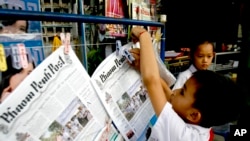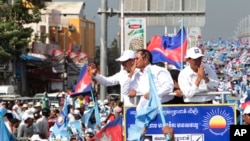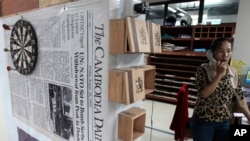It was a morning like any other for Hang Vengsreng and his friends, as they sat down for breakfast late last week at their favorite restaurant in the bustling center of Siem Reap and ordered Chinese noodles and coffee.
Yet, the 62-year-old car salesman and his friends grumbled and said they worried that something elementary had gone missing from their breakfast routine lately: an independent quality newspaper.
The men have been loyal readers of The Phnom Penh Post for years and are aware of its recent ownership change, which put Cambodia’s last independent newspaper in the hands of a Malaysian public relations firm with links to long-ruling Prime Minister Hun Sen.
“If there is no so such independent newspaper anymore, it’s bad.”
The takeover quickly raised fears of editorial interference after the new owner ordered a critical article about the sale taken down from The Post’s website and fired the editor-in-chief, which in turn prompted the foreign editorial staff to resign en masse last week.
“Let’s wait and see if the content will change or not. I am also concerned about it,” Hang Vengsreng told VOA Khmer when asked about the developments at the English-language and Khmer-language publication.
“If there is no so such independent newspaper anymore, it’s bad,” he told VOA. “No one watches the news on television,” he added while gesturing to a TV showing one of the many programs run by broadcast companies connected to the ruling Cambodian People’s Party (CPP).
You Mary, whose family runs a small newsstand next to Siem Reap Provincial Hospital, said The Post enjoys steady popularity with locals and foreign tourists, who buy about 10 copies of the Khmer edition and five of the English edition daily.
“Their news is true and not biased,” she said, adding that her mother had sold the muck-racking 26-year-old newspaper for most its existence. “I am afraid that the change in ownership means a change in content, and it will not be as good as before and become biased.”
A ‘government-coerced sale’
Since September 2017, the CPP government has launched a harsh crackdown on independent media and civil society that has resulted in the closure of the 24-year-old Cambodia Daily newspaper and Radio Free Asia’s Phnom Penh bureau, as well as the quieting of dozens of local-language radio stations that carried critical news reports.
Two former RFA reporters, Uon Chhin, 49, and Yeang Sothearin, 35, have been jailed on allegations of espionage, while two former Cambodia Daily journalists fled the country fearing legal charges related to their reporting.
Like The Daily, The Post was suddenly ordered by authorities to pay a tax bill of millions of dollars, but unlike the former paper, which was forced to close, the latter’s bill was settled after Australian mining magnate Bill Clough sold it to Malaysian public relations executive Sivakumar S. Ganapathy.
His firm lists Hun Sen as a past client, but Ganapathy has denied any current links to the prime minister. The Post’s new editor-in-chief, Malaysian Joshua Purushotman, declined to comment when contacted by VOA on Monday.
The New York-based Human Rights Watch has labeled it a “government-coerced sale” and its Asia director Brad Adams said: “This is a transparent misuse of power intended to choke off independent media and reporting in the run-up to July’s national elections.”
In September, the CPP government arrested the main opposition leader, Kem Sokha, on charges of treason and in November it dissolved his Cambodian National Rescue Party (CNRP). Hun Sen is virtually unchallenged at the polls and likely to extend his 33-year-long rule.
Cambodia’s once-vibrant media scene is now moribund and civil society under severe pressure.
The two dozen or so remaining English- and Khmer-language newspapers and radio stations are controlled by businessmen seen as linked to the CPP. The Post has an estimated circulation of several tens of thousands of copies, but - like The Daily - its reporting has had a critical impact.
‘A big loss’
Pa Nguon Teang, executive director of Cambodian Center for Independent Media (CCIM), said the apparent loss of independence at The Post - which has published critical, award-winning reports on government decision-making, corruption, land grabbing, and illegal logging – would be “a big loss” for Cambodian society.
He said social media and online information will be the only source of independent information left for Cambodians.
Teang’s CCIM ran the opposition-friendly Voice of Democracy radio station, but it was shuttered during the crackdown and only retains a popular Facebook page. He fled Cambodia after being charged in a separate case.
“The reliance on social media will now become more important. So some independent news (sources) inside and outside the country have to strengthen their quality and means to reach out (through social media),” Teang said in a phone interview. “Media literacy in analyzing news will also be important since it helps people to verify the true and fake news.”
Elizabeth Becker, a veteran journalist, and author who reported on the Khmer Rouge regime and Cambodia’s civil war said both The Post and The Daily had been crucial training grounds where countless Cambodian journalists developed critical and independent reporting skills.
“Other Cambodian media train journalists to follow the government line and to avoid stories that the government doesn't like,” she said, adding that she's worried that the next generation of local reporters would lack such learning opportunities with the demise of independent media.
A source of learning and insight
Many readers of The Post are higher-educated Cambodians, such as students, teachers, researchers and NGO workers, who rely on the paper to gain insight into Cambodia’s often opaque business and politics for their work, personal interest, or just to improve their English skills.
“The Post has a varied news coverage, and some of it is related to my research topic,” said Bin Rasmeykanyka, 27, a Phnom Penh-based academic who specialized in Cambodia-Korean relations for her Bachelor Degree of Arts with a major in Politics, Philosophy & Economics.
“It does quality reporting and its articles have different perspectives, such as government, NGOs, academics, that we can study and analyze,” she said. “As a reader, I hope the newspaper will continue their reporting in the same way. If they don’t meet my expectations, I will not read it anymore.”
“It is important to my life and to know what is truly happening in Cambodia.”
Noan Sereiboth, an NGO worker in the capital, lamented a potential drop in quality at The Post, saying he had been an avid reader since high school.
“It is important to my life and to know what is truly happening in Cambodia,” he said. “Their political analyses and investigations provide the truth and a deep understanding and knowledge, exposing some sensitive information we would not know otherwise.”
Ouk Raneth, an Economics teacher at a Phnom Penh high school, said he followed the paper’s business and economics stories to stay abreast of Cambodia’s rapid economic development.
“I like reading business stories, it increased my knowledge and sometimes I take (economics) statistics and use them to explain things to my students,” he said. “The Post doesn’t have any bias towards any political party… it dares to report and write freely.”








